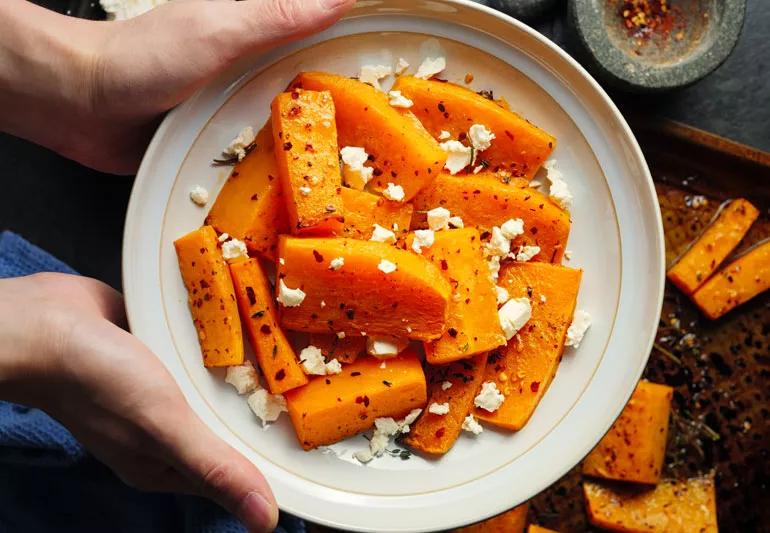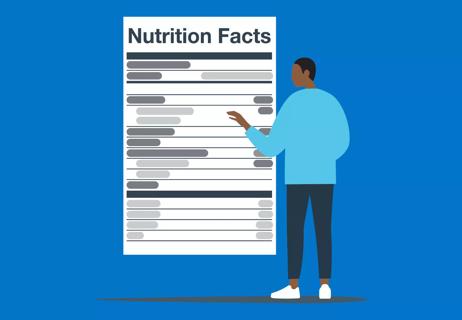Advertisement
High in vitamins C and B6, plus beta-carotene, squash helps with heart and eye health

Just like apples, the varieties of squash are seemingly endless — all with their own unique flavors, shapes and textures. But is squash good for you?
Advertisement
Cleveland Clinic is a non-profit academic medical center. Advertising on our site helps support our mission. We do not endorse non-Cleveland Clinic products or services. Policy
Registered dietitian Amber Sommer, RDN, LD, gives the 411 on the many health benefits of squash, along with how to make them a delicious addition to your diet.
Contrary to popular belief, squash is botanically classified as a fruit, not a vegetable. This is because it grows from flowers and has seeds. But squash brings the best of both produce worlds when it comes to health benefits. “They’re all relatively low in carbs, high in fiber and nutrient-dense,” says Sommer.
For example, winter and summer squash are low in calories and fat, and both are excellent sources of vitamin C. They also contain fiber, B vitamins and important minerals such as potassium and magnesium.
Sommer explains how these antioxidants, minerals and vitamins in squash benefit your health.
Squash contains antioxidants, which prevent cellular damage caused by free radicals. Antioxidants are a nutritional jackpot for your body — no risk and all reward.
“Your body creates free radicals naturally as it converts food into energy or in response to environmental factors like pollution. Free radicals are missing an electron, so they’re constantly looking to steal them from other cells,” explains Sommer.
“Too many free radicals create oxidative stress. Over time, oxidative stress causes cell damage and lays the foundation for disease development. But antioxidants fight free radicals, preventing this damage and staving off chronic ailments like cancer and heart disease.”
Beta-carotene is an antioxidant found in squash. Your body transforms beta-carotene into the essential nutrient vitamin A. Studies have also linked beta-carotene to a lower risk of cancers, including:
Advertisement
Squash is rich in minerals, including calcium. Calcium helps build and maintain healthy bones and teeth. The vitamins A and C in squash also help keep your bones healthy. In fact, a 2017 review of studies linked vitamin A deficiency to an increased risk of bone fractures.
Squash is a great source of iron. Iron deficiency can cause a host of problems, including anemia. Getting enough iron doesn’t just help prevent and treat anemia. “Research also shows that iron has benefits during menstruation, such as reducing fatigue and improving athletic performance,” notes Sommer.
Squash contains magnesium, which is essential for more than 300 processes in your body. “Magnesium maintains your heart rhythm and helps make DNA. It can also help you stay energized,” says Sommer.
Potassium-rich foods like squash also help your body function by supporting your heart and can help lower blood pressure. “And research has linked the beta-carotene in squash with heart disease prevention,” she adds.
Squash is a smorgasbord of powerhouse vitamins, including vitamins A and C. Studies show that vitamin A can help protect your eyes and plays a role in preventing night blindness and age-related macular degeneration.
In addition to being an immune health superhero and powerful antioxidant, vitamin C helps your eyes, too. Like vitamin A, it prevents and slows macular degeneration and may also help prevent cataracts.
Advertisement
Studies show that vitamin C and beta-carotene are good for skin health. Vitamin C is also connected with wrinkle prevention and wound healing.
Despite being #teamfruit, the U.S. Department of Agriculture (USDA) lumps squash in with veggies based on their nutrition content. According to MyPlate, the USDA’s nutrition guide for Americans, you should aim for two to four servings of vegetables daily. Where you fall in that range depends on your sex, age, activity level, height and weight. The USDA considers 1 cup of cubed, sliced or diced winter or summer squash to be one serving of vegetables.
“Nutritionally, butternut and acorn squash are arguably the overall MVPs, but it’s by the slimmest, most subjective of margins,” says Sommer. “However, don’t worry about choosing the healthiest squash. Instead, choose the ones that taste best to you and try to eat a variety to get the most benefit from eating squash.”
Try summer squash raw or spiraled into “zoodles” as a healthy substitution for noodles. They’re also yummy sautéed or roasted with olive oil. Winter squash is delicious (and sugary sweet like a sweet potato) when roasted. And both are great additions to soups and pastas.
Whether you add it to your favorite recipe or eat squash on its own, your body will thank you.
Advertisement
Learn more about our editorial process.
Advertisement

What’s on your plate can either help power you through your day or put you in nap mode

Information on serving size, calories and nutrients can help you make healthy choices

Often labeled as ‘diabetes-friendly’ or ‘calorie-free,’ these sugar substitutes warrant caution

Repeating your meals can help simplify meal planning and counting calories, but it could also lead to boredom and nutritional deficiencies

Making certain food and lifestyle choices can help keep your battery full

Pickles are low in fat and calories and rich in some vitamins and minerals, but they’re usually high in sodium

Fiber-rich shirataki noodles may improve blood sugar, aid in digestion and help with weight loss

Reducing inflammation is key when you’re in a flare-up, but so is having a preventive nutritional plan in place when you’re not

Focus on your body’s metabolic set point by eating healthy foods, making exercise a part of your routine and reducing stress

PFAS chemicals may make life easier — but they aren’t always so easy on the human body

While there’s little risk in trying this hair care treatment, there isn’t much science to back up the claims